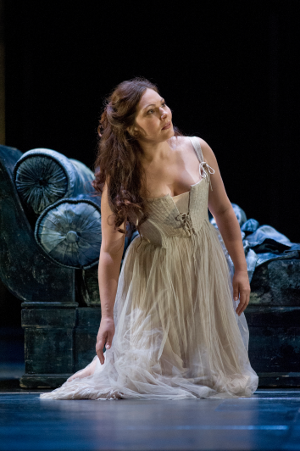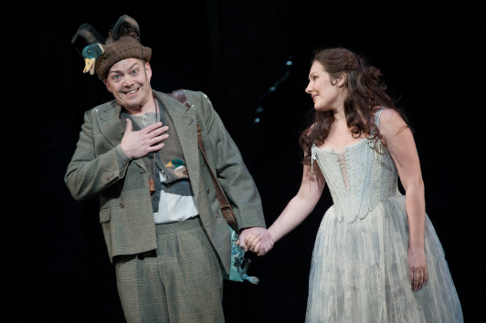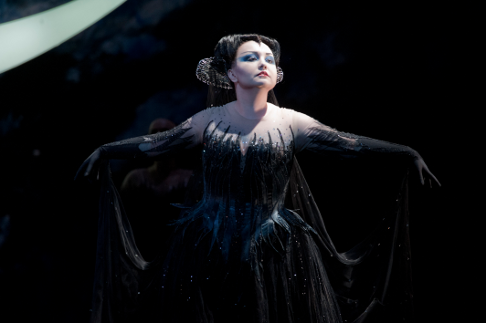![Charles Castronovo as Tamino [Photo © ROH / Mike Hoban]](http://www.operatoday.com/ZAUBERFLOTE_ROH_1015.png)
23 Apr 2013
Die Zauberflöte, Royal Opera
Back for its fourth revival, David McVicar’s 2003 production of Mozart’s Die Zauberflöte has much charm, beauty and artistry.
English Touring Opera are delighted to announce a season of lyric monodramas to tour nationally from October to December. The season features music for solo singer and piano by Argento, Britten, Tippett and Shostakovich with a bold and inventive approach to making opera during social distancing.
This tenth of ten Live from London concerts was in fact a recorded live performance from California. It was no less enjoyable for that, and it was also uplifting to learn that this wasn’t in fact the ‘last’ LfL event that we will be able to enjoy, courtesy of VOCES8 and their fellow vocal ensembles (more below …).
Ever since Wigmore Hall announced their superb series of autumn concerts, all streamed live and available free of charge, I’d been looking forward to this song recital by Ian Bostridge and Imogen Cooper.
Although Stile Antico’s programme article for their Live from London recital introduced their selection from the many treasures of the English Renaissance in the context of the theological debates and upheavals of the Tudor and Elizabethan years, their performance was more evocative of private chamber music than of public liturgy.
Evidently, face masks don’t stifle appreciative “Bravo!”s. And, reducing audience numbers doesn’t lower the volume of such acclamations. For, the audience at Wigmore Hall gave soprano Elizabeth Llewellyn and pianist Simon Lepper a greatly deserved warm reception and hearty response following this lunchtime recital of late-Romantic song.
For this week’s Live from London vocal recital we moved from the home of VOCES8, St Anne and St Agnes in the City of London, to Kings Place, where The Sixteen - who have been associate artists at the venue for some time - presented a programme of music and words bound together by the theme of ‘reflection’.
'Such is your divine Disposation that both you excellently understand, and royally entertaine the Exercise of Musicke.’
‘And there was war in heaven: Michael and his angels fought against the dragon; and the dragon fought and his angels, And prevailed not; neither was their place found any more in heaven … that old serpent … Satan, which deceiveth the whole world: he was cast out into the earth, and his angels were cast out with him.’
There was never any doubt that the fifth of the twelve Met Stars Live in Concert broadcasts was going to be a palpably intense and vivid event, as well as a musically stunning and theatrically enervating experience.
‘Love’ was the theme for this Live from London performance by Apollo5. Given the complexity and diversity of that human emotion, and Apollo5’s reputation for versatility and diverse repertoire, ranging from Renaissance choral music to jazz, from contemporary classical works to popular song, it was no surprise that their programme spanned 500 years and several musical styles.
The Academy of St Martin in the Fields have titled their autumn series of eight concerts - which are taking place at 5pm and 7.30pm on two Saturdays each month at their home venue in Trafalgar Square, and being filmed for streaming the following Thursday - ‘re:connect’.
The London Symphony Orchestra opened their Autumn 2020 season with a homage to Oliver Knussen, who died at the age of 66 in July 2018. The programme traced a national musical lineage through the twentieth century, from Britten to Knussen, on to Mark-Anthony Turnage, and entwining the LSO and Rattle too.
With the Live from London digital vocal festival entering the second half of the series, the festival’s host, VOCES8, returned to their home at St Annes and St Agnes in the City of London to present a sequence of ‘Choral Dances’ - vocal music inspired by dance, embracing diverse genres from the Renaissance madrigal to swing jazz.
Just a few unison string wriggles from the opening of Mozart’s overture to Le nozze di Figaro are enough to make any opera-lover perch on the edge of their seat, in excited anticipation of the drama in music to come, so there could be no other curtain-raiser for this Gala Concert at the Royal Opera House, the latest instalment from ‘their House’ to ‘our houses’.
"Before the ending of the day, creator of all things, we pray that, with your accustomed mercy, you may watch over us."
The doors at The Metropolitan Opera will not open to live audiences until 2021 at the earliest, and the likelihood of normal operatic life resuming in cities around the world looks but a distant dream at present. But, while we may not be invited from our homes into the opera house for some time yet, with its free daily screenings of past productions and its pay-per-view Met Stars Live in Concert series, the Met continues to bring opera into our homes.
Music-making at this year’s Grange Festival Opera may have fallen silent in June and July, but the country house and extensive grounds of The Grange provided an ideal setting for a weekend of twelve specially conceived ‘promenade’ performances encompassing music and dance.
There’s a “slide of harmony” and “all the bones leave your body at that moment and you collapse to the floor, it’s so extraordinary.”
“Music for a while, shall all your cares beguile.”
The hum of bees rising from myriad scented blooms; gentle strains of birdsong; the cheerful chatter of picnickers beside a still lake; decorous thwacks of leather on willow; song and music floating through the warm evening air.
![Charles Castronovo as Tamino [Photo © ROH / Mike Hoban]](http://www.operatoday.com/ZAUBERFLOTE_ROH_1015.png)
Back for its fourth revival, David McVicar’s 2003 production of Mozart’s Die Zauberflöte has much charm, beauty and artistry.
But, with the oft-exhumed sets now looking rather creased and crumpled, on this occasion some of the sparkle seemed to have rubbed off.
 Ekaterina Siurina as Pamina
Ekaterina Siurina as Pamina
Dedicated to the late Sir Colin Davis (who conducted the premiere and the most recent revival in 2011), this performance was at times disappointingly lacklustre: the crescent moon gleamed and glinted, the sumptuous tableaux impressed, the choreography was slick, but overall there was an absence of simple youthful vitality and dreamy enchantment.
Conductor Julia Jones established some brisk tempi; she was perhaps a bit too swift for her players at the start, for the opening three ‘knocks at the door’ were rather messy, lacking in masonic authority and imperiousness. Certainly there was tension and anxiety during Tamino’s tussle with the serpent, but elsewhere Jones might have adopted a more spacious, composed approach — for there the opera presents much farce and fury but also sobriety and solemnity.
Reprising the role of Papageno, Christopher Maltman was in superb form, relishing the physical and vocal humour and winning over the audience with his mischievous appeal and essential good nature. Maltman’s duet with Ekaterina Siurina (Pamina), ‘Bei Männern welche Liebe fühlen’, in which they reflect on the sacred duties and divine purity of marital love, was one of the highlights of the evening — although it did unfortunately expose Siurina’s somewhat unidiomatic German pronunciation alongside Maltman’s immaculate diction.
 Christopher Maltman as Papageno and Ekaterina Siurina as Pamina
Christopher Maltman as Papageno and Ekaterina Siurina as Pamina
Siurina’s soprano is wonderfully rounded and rich — and she possesses a similarly beautiful, touching pianissimo too, as she proved in a deeply heart-rending ‘Ach, ich fuhls’. She can bring a characterful glint to her voice, but to my ear the overall tone was a little too full for the role and her stage persona rather too assertive and spirited.
The same was true of her Tamino, Charles Castronovo, who strode the stage with the same confident ease with which he vocally assailed the melodic heights; but, while his athleticism and purposefulness brought some expedient dynamism to the production, surely Tamino is a prince learning his heroic craft rather than a king who has already earned his stripes. After a slightly hesitant start musically, Castronovo’s tone was gracious and dignified, and his articulation of the text matched Maltman’s for clarity. Technically secure throughout, his Act 1 aria ‘Dies Bildnis ist bezaubernd schön’ was certainly ardent but a little lacking in youthful freshness.
Albina Shagimuratova was a pitch-perfect Queen of the Night, dispatching the coloratura extravagances of ‘O zittre nicht, mein lieber Sohn’ with grace and buoyancy. Her effortless runs did not always convey the necessary glint of latent malevolence, however, and she made a less striking dramatic impact than one might have expected. ‘Der Hölle Rache’ was less polished technically but the tone was still gleaming and sweet.
 Albina Shagimuratova as Queen of the Night
Albina Shagimuratova as Queen of the Night
As Sarastro, Brindley Sherratt, singing with rich lyricism and poise, was suitably dignified but like Shagimuratova, at times needed more stage presence and profundity. Peter Hoare deftly emphasised the hyperactive hypocrisy of the villainous Monostatos.
The minor roles were all laudable with Sebastian Holocek a distinctive Speaker, and David Butt Philip and Jihoon Kim commendable in the roles of the First and Second Armed Man respectively. Susana Gaspar overcame the ugly inaptness of her Essex-girl attire as a perky Papagena who wins over her Papageno.
Overall, this production is beautiful to the eye and ear, but despite the zippy tempi it felt rather weary; time has dulled the magic dust.
Claire Seymour
Cast and production:
Tamino — Charles Castronovo; First Lady — Anita Watson; Second Lady — Hanna Hipp; Third Lady — Gaynor Keeble; Papageno — Christopher Maltman; Queen of the Night — Albina Shagimuratova; Pamina — Ekaterina Siurina; Monostatos — Peter Hoare; First Boy — Archie Buchanan; Second Boy — Luciano Cusack; Third Boy — Filippo Turkheimer; Speaker of the Temple — Sebastian Holecek; Sarastro — Brindley Sherratt; First Priest— Harry Nicoll; Second Priest— Donald Maxwell Pagagena — Susana Gaspar; First Man in Armour — David Butt Philip; Second Man in Armour — Jihoon Kim; Conductor —Julia Jones; David McVicar — Director; Leah Hausman — Revival & Movement Director; John Macfarlane — Designs; Paule Constable — Lighting Design. Royal Opera House, Covent Garden, London, Tuesday, 16th April 2013.